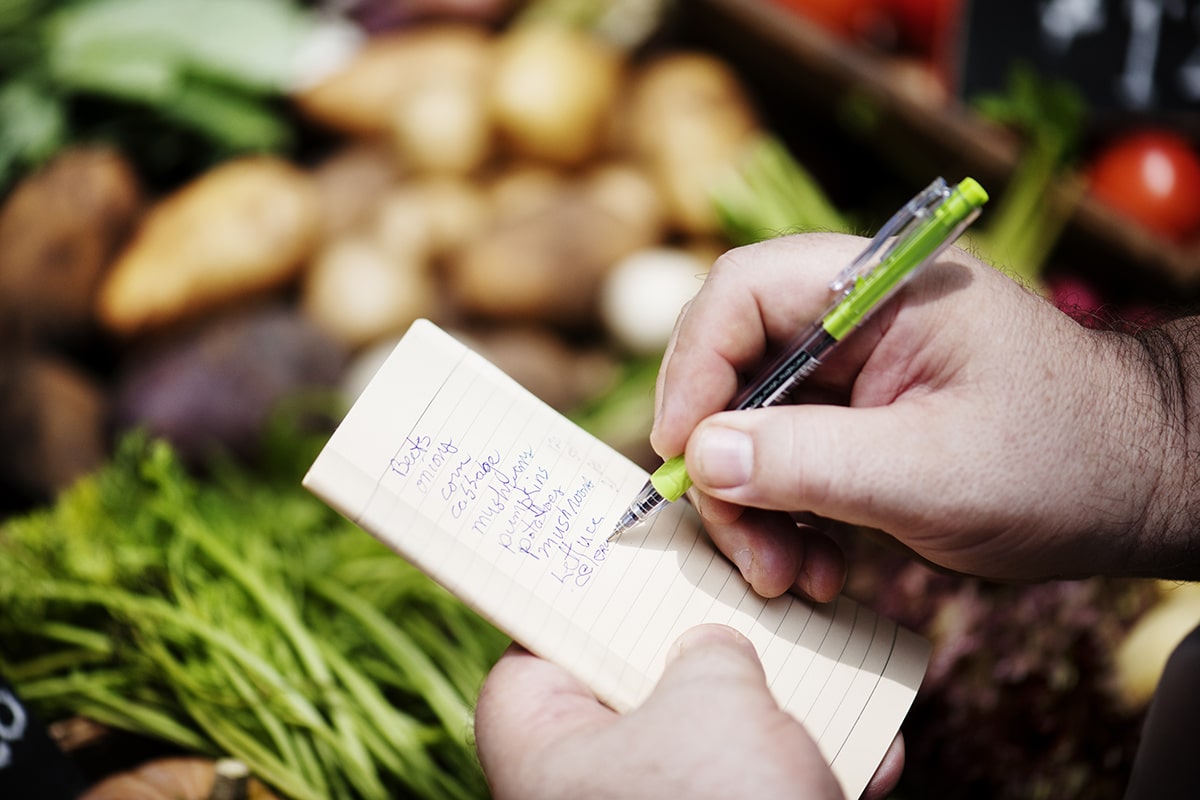
This episode is bought to you by Quell — to help support rebuilding healthy skin from the outside-in + inside-out!
Take 10% off your next order! Use promo code QUELL10 at check out — Get started HERE!
– – –
If you’ve thought that there is an official eczema trigger foods list you should follow…
Think again.
These lists are often made up of arbitrary foods that may or may not be a problem for you.
Often these lists scare people into avoiding foods unnecessarily which can have unintended consequences for your physical and mental health (as well as your relationship with food).
Instead of seeking out a list of foods to avoid when you have eczema, it’s wiser to question why you are reacting to certain foods in your diet.
If there’s a legitimate IgE food allergy – that’s one thing (and it’s best to follow your doctor’s recommendation on that front).
But assuming you now have a food sensitivity or food intolerance may mean you miss crucial clues to hidden problems lurking below the surface.
Here’s my take based on my work as a clinical nutritionist on why certain foods can make your eczema worse!
Or, listen on your favorite app: iTunes (Apple Podcasts) | Spotify | Stitcher | TuneIn | Subscribe on Android
In this episode:
- Eczema trigger foods list: Does one exist?
- Thoughts on different naturally occurring food chemicals + eczema flares
- Breakdown on what gut function is + how it can contribute to eczema
- Why you might be reacting to certain foods (that has nothing to do with the food itself)
- Debunking the notion that eczema is all about food sensitivities
Quotes:
There is no official list of eczema trigger foods no matter what you research online.
When there are gut function issues, the way food will interact with your gut will likely be problematic.

267: Can Certain Foods Make Eczema Worse? (FULL TRANSCRIPT)
Welcome back to episode #267 of the Healthy Skin Show!
In today’s episode, I want to answer a very common listener question about eczema trigger foods. Almost weekly, I’m asked for a list of foods that could possibly worsen eczema symptoms or cause a rash flare-up.
Just yesterday I was asked to talk about sugar + alcohol as potential trigger foods in my Instagram messages.
While I’d love to do solo episodes on individual foods and atopic dermatitis, I can tell you right now that the answer would be rather redundant which is why I figured I’d set the record straight in this episode.
I’ve covered several food chemical triggers such as the concern about salicylates in episode 97 and nightshades in a lengthy article HERE.
You can find information about nickel allergy + diet concerns in episode 37 with Dr. Peter Lio as well as in another article HERE.
And I’ve also discussed histamine at length (which clearly has diet implications) in a two-part series found in episodes 188 and 192.
Despite this, I still get questions about whether various foods could be triggers which underscores just how oriented we’ve become to believe that food is the biggest problem facing eczema these days thanks to loads of misinformation shared online and in popular books on the topic.
The most troubling part of this all is that this narrative pits you against food (aka. nourishment) which is on many levels potentially harmful.
We now have newer research demonstrating the physical and mental consequences that unnecessary diet restrictions cause that should be seen as a wake up call about how we view food in terms of eczema (which I’ll share in a future episode).

Eczema Trigger Foods: Is There An Official List?
“Where can I find a list of eczema trigger foods on your website?”
“Do you have a podcast where you talk about which foods are inflammatory?”
“Can you tell me why I flare up when I eat ____?”
These are just a few variations of questions that I get from listeners who are motivated to figure out what’s driving their rashes so they can finally get some relief.
I completely get it.
While food may play some part in rash flare-ups (assuming we’re not dealing with IgE food allergies), there’s a bigger reason that you can end up feeling like certain foods make your rashes worse.
And to be honest, it’s very difficult for you to sort out because what I’m about to share isn’t what’s discussed on blogs + in eczema diet books.
That said, I think it bears stating that there is no official list of eczema trigger foods no matter what you research online.
Some foods may be a problem for some people, but they also may be tolerated perfectly fine by others (eggs and citrus are both examples of this).
Unless you’re dealing with an IgE allergy, the reason you react to certain foods is likely due to gut function + gut microbiome imbalances.
So let’s unpack these both separately to make this easier to understand.

How Your Gut Is Connected To Eczema Trigger Foods
When I talk about the gut, I make a point to differentiate between gut function + your gut microbiome because while they are certainly connected, they’re also separate issues.
Gut function refers to the process of chewing and then digesting food to extract nutrition which is then absorbed. This would also encompass stomach acid production, enzyme secretion, short-chain fatty acid levels, and other hormones and factors associated with this process.
A second part of gut function is gut motility – meaning how quickly (or slowly) things move through your GI tract. This can be impacted by a litany of issues including hydration, gut microbiome issues, stress response, and vagus nerve imbalances.
And then we’ve got to consider gut permeability and immune function within the GI tract.
Your gut is literally one cell layer thick coated by a mucosal lining that’s meant to keep what’s inside your gut (like food particles + gut bugs) inside the gut tube away from mingling with those gut cells and away from the cell junctions.
Basically what’s inside your gut tube should generally stay there unless it’s appropriately digested and absorbed by your cells.
To be honest, this is an extremely simplified overview for the sake of time, and I intend to help listeners have a basic understanding of what’s going on.
I share all of this because when any part of gut function is compromised, we have a problem.
There are no backup systems in the GI tract when it comes to gut function.
Typically when there is a gut function issue further upstream (such as low stomach acid), other issues will ensue further downstream.
And when there ARE gut function issues, the way that food will interact with your gut will likely be problematic and absolutely can contribute to a flare-up in symptoms.
In my experience, it is highly common for chronic eczema cases to have some gut function issues lurking under the surface.

Your Gut Microbiome + Eczema Trigger Foods
When there are gut function issues, there is commonly some sort of gut microbiome issue also lurking (though the extent of the imbalance will depend upon a variety of factors and will differ from case to case).
I started to discuss this in last week’s episode on the Eczema-Gut Connection Part 1 where I discussed imbalances with commensal gut bacteria.
However opportunistic commensal organisms (like Candida albicans) and truly unfriendly (aka. pathogenic) organisms can also gain access to the GI tract.
These organisms can produce waste products that triggering to your body which also can overwhelm your Phase 2 liver detox pathways which I talk about in episode 177.
Either way, the makeup of your gut microbiome is equally important to what’s going on within the gut.
And ultimately what we often perceive as reactions to food are more commonly an inappropriate interaction between the food and the gut (either due to compromised gut function and/or microbiome imbalances).
I certainly understand that it’s easy to assign blame after experiencing a flare-up after eating a specific food.
You know what the input was – food.
And you also know what the ultimate outcome was – a flare.
What you don’t know is what happened once the food was swallowed.
That’s where things become a bit trickier and more difficult to suss out.
Since we’re so used to hearing endlessly about leaky gut and food sensitivities, that’s the first place where everyone’s mind runs.
As a clinical nutritionist who works with eczema clients, I know that the answer here isn’t so black and white.
And it underscores why I prefer to clearly explain to my clients what’s going on. I don’t want clients or even you (the listener) to walk away from this conversation blaming food when it really wasn’t the food’s fault.
For example, if you have low stomach acid because of a hidden H.pylori infection, you’ll likely fail to break down protein sufficiently. The amount of amino acids that can be absorbed drops which means that partially undigested proteins travel further downstream to the colon (where they shouldn’t be) and end up getting fermented by gut bugs.
This process is called putrification and is clearly not normal (since your gut flora should ferment fiber, not protein) and can cause a flare-up.
So if you were to blame the chicken or egg or something else very protein-dense, that would be incredibly short-sighted because it’s not actually the food’s fault.
It’s the issues going on in the GI tract causing this type of inappropriate reaction.
So rather than jumping to blame food, I love to ask the question “WHY is this happening?” and then seek answers from there.
Oftentimes, reactions to foods are trying to point us to a problem.
But if you don’t know how to translate the information, I can most certainly understand why it’s easy to just blame it on the food.
This all said – I do want to clarify that gut problems are not the ONLY reason you could have chronic atopic dermatitis.
I shared in episode 53 about the 16 different root causes of eczema (and other chronic skin issues) where food + diet are only ONE of the potential issues.
You can actually go through the process of determining which root causes are a problem for you HERE with my free guide that walks you through the process.
If you’ve got any questions or thoughts to share about this, leave a comment below so I can address them.
And please share this episode with eczema warriors who may be thinking that food is their big culprit and perhaps are in need of a different perspective about what could be going on.
Thank you so much for tuning in and I look forward to diving deeper with you in the next episode!

Jennifer Fugo, MS, CNS
Jennifer Fugo, MS, CNS is an integrative Clinical Nutritionist and the founder of Skinterrupt. She works with women who are fed up with chronic gut and skin rash issues discover the root causes and create a plan to get them back to a fuller, richer life.





